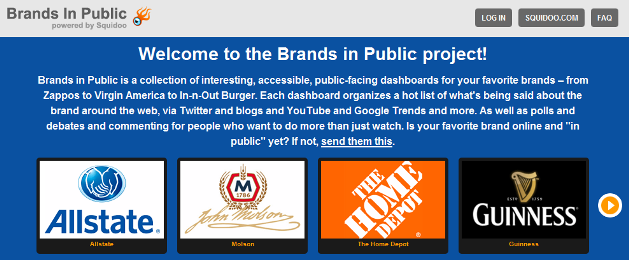
Remember Squidoo? Founded by current CEO and famous marketing guru Seth Godin, the service allows Internet users to generate rich, topical web pages (dubbed ‘lenses’) to serve as a hub for information, videos, links etc. centered around any given subject. The concept is similar to what companies like HubPages, Mahalo and Helium are all about.
Now Squidoo is looking to monetize the web service directly – rather then depend on on-site advertising – by persuading brands to pay for management of their respective lenses.
In a blog post, Godin shares more details about the new initiative – dubbed ‘Brands in Public’ – and explains why he believes brands will be willing to pay for it.
You can’t control what people are saying about you. What you can do is organize that speech. You can organize it by highlighting the good stuff and rationally responding to the not-so-good stuff. You can organize it by embracing the people who love your brand and challenging them to speak up and share the good word. And you can respond to it in a thoughtful way, leaving a trail that stands up over time.
That all sounds super duper, and I have the highest respect for the man, but I also have mixed feelings about the way Squidoo is going about it.
Rather than convincing companies to set up their own public profile pages for their brands to aggregate and manage online conversations, Squidoo is creating hundreds of unofficial ones (e.g. for Guinness) in the hopes that companies will come to them and cough up $400 per month for the right to develop the page on their terms. Once a company pays up and gains control over the relevant Squidoo lens, the left hand column will ‘belong’ to them.
This will enable companies to post responses, highlight third-party blog posts, run contests and quizzes, and more. Basically, it becomes a place where companies can both lead, monitor and respond to the online conversations about their brands, which Godin says is particularly helpful when shit storms brew on the Web (whether deserved or not).
I’m not sure I like the fact that Squidoo takes the lead in creating pages for brands only to ‘unlock’ them for a monthly fee afterwards. Sure, there’s some truth to its claim that conversations are happening around the web anyway and they’re merely aggregating them, but I’m sure many will claim that the company is doing this for obvious SEO reasons. Get Satisfaction follows a similar strategy of holding company profile pages ‘hostage’, and has in the past been criticized for that behavior.
I also think a $400/month price point is extremely high for something that can easily be built internally. Squidoo seems to realize this and offers the first 100 brands to sign up a share of the $500,000 in-house ads that the company will run across the site promoting the service and the first partnering brands.
Either way, Squidoo already signed up a number of beta-testers (e.g. Home Depot) and hopes to attract more brands in the near future. The company published an e-book (PDF) about why any company should be considering this, and in it shared some numbers about the Squidoo network size.
Founded 3 years ago (Michael Arrington thought it could become Godin’s ‘purple albatross’ at the time), Squidoo claims it has attracted 400,000 users who hand-built over 1 million pages to date. Squidoo also says it has raised a ‘significant’ yet undisclosed amount of capital for charity and is one of the 500 most-trafficked sites on the Web. Looking at the Compete chart below, they do seem to be getting a decent amount of visitors (about 4.4 million a month) even if its two closest competitors both attract a bigger audience at this point.

